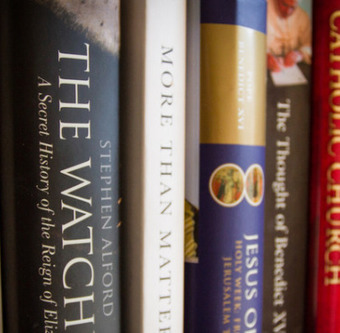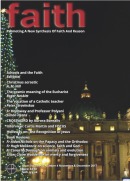
Book Reviews - A marriage of biology and theology?
The Wisdom of the Liminal: Evolution and Other Animals in Human Becoming
by Celia Deane-Drummond,
Eerdmans, 378pp, £20.39.
reviewed by Conor McDonough
Discussion of animals in a theological context, when it does arise, has tended to be limited to moral questions: Can we experiment on animals, and if so, for what purpose? Do we have a duty to make sure farmed animals are reared in comfort? Is recreational hunting to be condemned? Theological talk about animals typically drifts into the realm of dogmatic theology only in the question of the survival of animals after death.
Professor Celia Deane-Drummond’s book, The Wisdom of the Liminal: Evolution and Other Animals in Human Becoming, is an ambitious attempt to counter this trend by bringing questions about animals – as evolved and evolving – into a sustained dialogue with theological anthropology, seeking thereby to reshape the theological vision of the human person. Deane-Drummond’s aim is to lead her readers to consider the human being first and foremost as linked with other animals – ecologically and evolutionarily – rather than as separate from them. There are obvious parallels here with Alasdair MacIntyre’s Dependent Rational Animals, but Deane-Drummond’s approach is rather more pugnacious: she wants to diminish the anthropological ‘self-importance’ she finds in much Christian theology (p. 52).
Theology and research at the coalface
Deane-Drummond is particularly well qualified to facilitate a dialogue between theology and science: she has doctorates both in biology (plant physiology) and theology, and is currently Director of the Centre for Theology, Science and Human Flourishing at Notre Dame University. Given her dual expertise, she is particularly sensitive to the mutual ignorance that characterises contemporary theology and science. Against this background, she draws on a wide range of up-to-date research in the biological sciences, and while she aims to correct elements of the Catholic theological tradition, she is nevertheless keen to establish continuity with that tradition. She chooses Thomas Aquinas as a principal point of reference, principally because she sees Aristotelian background as favouring a consideration of other creaturely kinds, but she pays particular attention also to Hans Urs von Balthasar. What is valuable in all this is that the author is neither a theologian with vague notions about science, nor a scientist with woolly ideas about the divine. Rather, she writes as a Christian – and Christocentric – theologian who is also comfortable at the coalface of research in the natural sciences.
Biology and theology parallels
A typical chapter begins with detailed discussion of recent scholarship in evolutionary biology and ethnography, including debates within such scholarship, and proceeds to correlate these (disputed) findings with the writings of Thomas Aquinas and contemporary theologians. For example, in one of the better chapters, entitled ‘Human Justice and Animal Fairness’, the reader is introduced to Maasai systems of gift-giving, game theory as applied to chimpanzee behaviour, canine sensitivity to fairness, rules of play among wolves and rats, before a brief detour into Martha Nussbaum’s development of Rawlsian justice theory leads us to an extended discussion of Aquinas’ understanding of justice as a virtue, acquired and infused. Without taking a strong stand on the controversial question of whether inter-species relationships ought to be governed by justice – in other words, the question of whether we owe anything to animals as such – the author establishes all sorts of interesting parallels between evolutionary biology and traditional theology in this area, as well as challenges from one to the other.
Turgid sentences
This all sounds very promising, but the work suffers from three flaws. The first is the style of writing, which reproduces the turgid sentence structure that has come to characterise much academic writing. Consider the following example, which is by no means unrepresentative:
I interpret the idea of theo-drama as, in one sense, a theological commentary on Ingold’s concept of life as movement, a human becoming through deliberate placing of the human person in the movement of the play as a way of bringing forth not simply that which is unique to human beings, but structuring human life as part of a wider bringing forth (p. 51).
Time and again when reading this book I found myself staring at such sentences, and strings of such sentences, and simply scratching my head. Neologisms abound, with intermittent helpfulness. It is possible that one needs simply to be attuned to this particular dialect, but it is certain that this book could have done with more rigorous editing.
Misreading Aquinas
A second problem is Deane-Drummond’s reading of Aquinas. As a Dominican I rejoice to find a scientist-theologian attempting to take in the full breadth of Thomas’ theology and taking it seriously on its own terms, but her interpretation of Aquinas is sometimes faulty. To take one example, the author suggests that we might legitimately interpret his teaching on infused grace in a bottom-up fashion, so that infused grace becomes ‘the emergence of awareness of the ever-present presence of God’ (p. 84). This conception of grace is utterly alien to Thomas. He certainly recognises the ‘ever-present presence’ of the Trinity in creation, but grace consists in a ‘new mode’ of this divine presence which has a real ontological effect in the recipient; it can in no way be reduced to a new mental perspective on the part of humans. Elsewhere the author makes a similar claim, eliding the distinction between providence and grace (p. 56). These are not the only such mis-steps, and I couldn’t help feeling that Deane-Drummond would benefit from increased exposure to the living tradition of Thomist theology, a tradition which, it should be noted, is now taking especially seriously the challenge of evolution (see thomisticevolution.org).
Comparing apples and oranges
Finally, there is the difficulty of sustaining a conversation between interlocutors who are speaking equivocally. Increasing academic specialisation combined with the disintegration of a philosophical background that would unite theology, the humanities and the sciences makes Deane-Drummond’s task near impossible. She compares research from biology, anthropology, sociology and theology on topics like ‘reason’, ‘justice’, and ‘love’, but the incommensurability of the underlying models employed by these disciplines, and even within these disciplines, means she is often comparing apples and oranges. There are important differences between the altruism observed by zoologists, and caritas as described by St Thomas (Chapter 8), and a biologist who ascribes the ‘emotion of forgiveness’ to hyenas is betraying a conceptual hinterland quite unlike that of the Thomist (Chapter 4). Deane-Drummond is not, of course, unaware of these problems, but she does not delay over them in her mission to establish points of contact between theology and science.
A ‘forced marriage’
For this reader at least, this book shows above all that there is great need of careful, clarifying philosophical work by theologians and scientists before any ambitious ‘synthesis’ is attempted. This work takes time, and in the contemporary university, where one must ‘publish or perish’, governed by the iron will of funding bodies, such work is not easily accomplished. Deane-Drummond mentions in a footnote a ‘forced marriage’ between a theologian and a mathematician who were required by the Templeton Foundation to collaborate. My overall sense in reading this book was that, for all its ambition and breadth of vision, it too amounts to something of a ‘forced marriage’, or at least a premature one.
Notes:
Conor McDonough OP is a recently-ordained priest of the Irish Province of Dominicans, currently engaged in further studies in theology at the University of Fribourg, Switzerland





